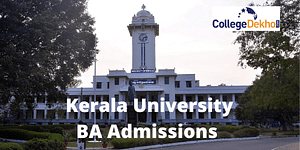MA Rural Development
About MA Rural Development
Master of Rural Development or MA Rural Development is a two-year postgraduate programme that teaches the students techniques through which they can improve the life quality and economic well-being of those who are living in the rural areas or non-urban areas. In the postgraduate programme in rural development, the students are also taught the significance of rural society’s issues related to development. MA Rural Development is a two-year postgraduate programme and the syllabus is spread over four semesters.
A master’s degree programme like MA in Rural Development concentrates on giving the students a clear perspective on the methods that are applied for upgrading lives in rural regions. Through the course, the candidates are given a clear perspective on the rural areas, and their lives and shown how the tested methods can be implemented to improve their health, standard of life etc.. The MA Rural Development course trains the students in a manner that they become able to identify rural issues and resolve them. The course equips the students with the industry-required skills that would help them to make a successful career in the arena of rural development. The course aims to train individuals to become skilled professionals in the field.
MA Rural Development Highlights
Major highlights of MA Rural Development are cited below:
|
Course Name |
MA Rural Development |
|---|---|
|
Duration |
2 Years |
|
Eligibility |
Bachelor’s Degree in any discipline |
|
Admission Type |
Merit/Entrance-Based admission |
|
Average Course Fee |
INR 2850- INR 30,200 |
|
Job Profiles |
Rural Manager, Rural Development Officer, Teacher/Lecturer, Senior Programme Officer, Rural Technology Project Head |
|
Recruiting Organizations |
NABARD, CARE, Rural Banks, Universities, Colleges, NGOs, UNESCO, etc. |
|
Average Salary |
INR 4.2 LPA |
Why Pursue MA Rural Development?
India has large rural areas that need developments in spheres of life including education, health, food, economy, etc. To improve the quality of life in rural areas a large number of professionals are needed. Hence, employment opportunity in this sector is quite good.
Govt. job scopes are quite high in this sector. Individuals who pursue this course can work as Village Development Officers, Rural Managers, etc. After pursuing the MA Rural Development course, candidates who work as rural managers can start their ventures like NGOs and others. The National Level NGOs like SEWA, CARE, PRADHAN, etc. hire professionals having MA in Rural Development degrees. Successful candidates can work in non-government organizations as well.
Table of Contents
MA Rural Development Eligibility Criteria
Anyone who has a Bachelor’s degree in any discipline from a recognised University is eligible to apply for the MA Rural Development programme provided he/she has obtained an aggregate of 50% at the qualifying level.
MA Rural Development Admission Process
The admission process of MA in Rural Development is different in various colleges and institutions. Usually, the applicants are put through a rigorous selection process which includes an entrance exam followed by counselling, group discussion and personal interview rounds. Some institutes/colleges also offer direct admission into the Master of Arts in Rural Development programme on the basis of the applicant's scores in the bachelor's degree exam.
Described below is both the merit and entrance test-based admission process followed by the universities/colleges that offer MA Rural Development course.
Merit-Based Admission
In merit-based admission, marks in graduation are considered the sole parameter for the candidates’ selection. Based on the marks of the last qualifying exam, the colleges prepare a merit list. Selected candidates are then offered admission to the MA Rural Development courses.
Entrance Test-Based Admission
- Candidates register for the MA Rural Development entrance exam by visiting the official website and providing the required details like email id, phone number, etc.
- Once the login Id and password are generated, candidates fill up the online form with essential details
- Then they submit the application form and the application fees within the stipulated time
- By evaluating the details provided in the application form, colleges/universities then provide the admit cards
- Candidates then appear on the MA Rural Development Entrance exam and qualified candidates are offered the final admission
MA Rural Development Entrance Exam
To get admission to the MA Rural Development Colleges in India, candidates must ensure that they appear on the entrance exam and score the required cut-off marks. Some of the common entrance tests for the MA Rural Development course are as follows:
TISNET
Candidates need to be aware of the syllabus of the entrance exams for MA Rural Development. The objective of such entrance exams is to assess whether the candidates have a basic concept of rural development. After getting qualified in the entrance test, candidates are called for a further round of selection.
MA Rural Development Top Colleges in India
MA Rural Development Top Colleges ensure to teach through a course-specific syllabus and impart the knowledge that is required in the practical work sphere. Some of the MA Rural Development top colleges are mentioned below:
|
Colleges |
Location |
|---|---|
|
Guntur, Andhra Pradesh |
|
|
Andhra University |
Visakhapatnam, Andhra Pradesh |
|
Binod Bihari Mahto Koyalanchal University |
Dhanbad, Jharkhand |
|
Dr. Shyama Prasad Mukherjee University |
Dhanbad, Jharkhand |
|
CMJ University |
Re-Bhoi, Meghalaya |
|
Sagar, Madhyapradesh |
|
|
Dr. B.R. Ambedkar University |
Srikakulam, Andhra Pradesh |
|
BMT University |
Narmada, Gujarat |
|
Bangalore University |
Bangalore, Karnataka |
|
Government Raza Post Graduate College |
Rampur, Uttarpradesh |
|
Himachal Pradesh University |
Shimla, Himachal Pradesh |
|
IIS University - International College for Girls - ICG |
Jaipur, Rajasthan |
|
Indira Gandhi National Tribal University |
Amarkantak, Madhyapradesh |
|
Indira Gandhi National Open University |
New Delhi, Delhi |
|
Kalyani University |
Nadia, West Bengal |
|
Birbhum, West Bengal |
|
|
Mumbai University |
Mumbai |
MA in Rural Development Distance Learning
The MA Rural Development course is offered through distance education also. The MA Rural Development distance education is suitable for candidates who want to pursue the course in flexible hours. Distance education for post-graduate Rural Development courses is preferred by the working professionals who need to pursue the course for career advancement but have a limited time after their work hours.
Graduate candidates of any discipline can apply for this course and the admission will be based on the marks of the previous qualifying examination. The minimum course duration is 2 years. One can take a maximum of 5 years to complete the course in distance education. There is no age bar for the course. The average course fee is about INR 9,000. Listed below are two important colleges that offer MA in Rural Development Distance learning programmes:
|
Name of the University/College |
Average Course Fees |
|---|---|
|
Indira Gandhi National Open University ( IGNOU) |
Rs. 9000/- |
|
Nalanda Open University |
Rs. 4400/- |
MA Rural Development Syllabus
Tabulated below is the semester-wise syllabus for MA Rural Development:
Semester - I
Economics for Rural Development |
Indian Rural Social Scene |
|---|---|
|
Indian Rural Economic Scene |
Dimensions and Concepts of Rural Development |
Semester - II
Social Research and Computer Applications for Rural Development |
Working with People - Techniques and Processes |
|---|---|
|
Rural Development Institutions and Strategies |
Rural Industrialization and Entrepreneurship |
Semester - III
Human Resource Development in the Rural Sector |
Natural Resource Management - Vegetation |
|---|---|
|
Natural Resource Management - Water |
Natural Resource Management - Land |
Semester - IV
Voluntary Action for Rural Development |
Rural Credit and Marketing |
|---|---|
|
Rural Project Planning and Management |
Women Empowerment, Self Help and Micro Finance |
MA Rural Development Career Options and Job Prospects
A Masters degree holder in Rural Development can opt for either of the following job opportunities -
- Rural Technology Project Head
- Teacher & Lecturer
- Rural Manager
- Senior Programme Officer
MA Rural Development Scope
The points given below prove that the future scopes for the candidates for the MA Rural Development course are excellent in terms of both higher education and career options.
Scopes for Higher Education- Higher education opportunities like MPhil and PhD are good options for those who want to learn more about rural development. After completing MA one can enroll in the MPhil course. Doing this course will create some better opportunities for the learners. To develop research skills, one can go for a PhD course. The degree will help the candidates to start a career with higher pay packages.
Scopes for Job- Being a country of having large rural areas, India has immense scope for professionals working in the rural development field. After the successful completion of the MA in Rural Development, some students prefer to begin their career and they can appear in different Government competitive exams like UPSC, SSC, and State Public Service Commission exams. Apart from the MA Rural Development Govt Jobs, one can work in the corporate sectors that are engaged in rural industrialization.
MA Rural Development Job Profiles
MA Rural development has become one of the most popular courses in which a large number of students enroll to gain knowledge in rural development. Those who are concerned about the overall development of India’s rural areas and want to contribute to the development process can work in the following posts.
Rural Manager- The key responsibility of a rural manager is to provide support to different rural sectors in executing their operations. These professionals aid the farming, handicraft, and rural development organizations, educational institutions, cooperative firms, etc. in traditional marketing, managing human resources, production processes, and others.
Rural Development Officer- A Rural Development Officer is a state government officer working for rural development. The responsibility of an RDO includes assisting and implementing different development projects in rural areas, managing development activities, etc.
Teacher/Lecturer- By acquiring the required qualification after MA in Rural Development, one can begin their career as a professor.
Senior Programme Officer- A Senior Programme Officer takes on projects and helps in building team structure. As a part of this team, he guides the program strategy and coordinates with the other senior members.
Rural Technology Project Head- A Project Head is liable for managing the end-to-end delivery of the assignment.
MA Rural Development Salary
Salaries for the MA Rural Development jobs are mentioned below:
|
Job |
Average Salary (Annual) |
|---|---|
|
Rural Manager |
INR 400,000 |
|
Rural Development Officer |
INR 242,000 |
|
Teacher/Lecturer |
INR 350,000 |
|
Rural Technology Project Head |
INR 420,000 |
FAQs about M.A. Rural Development
What are the top colleges offering M.A. Rural Development courses ?
I want admission in M.A. Rural Development. Do I have to clear any exams for that ?
What is the average fee for the course M.A. Rural Development ?
What are the popular specializations related to M.A. Rural Development ?
What is the duration of the course M.A. Rural Development ?
Related Questions
Popular Courses
- Courses
- M.A. Rural Development


















